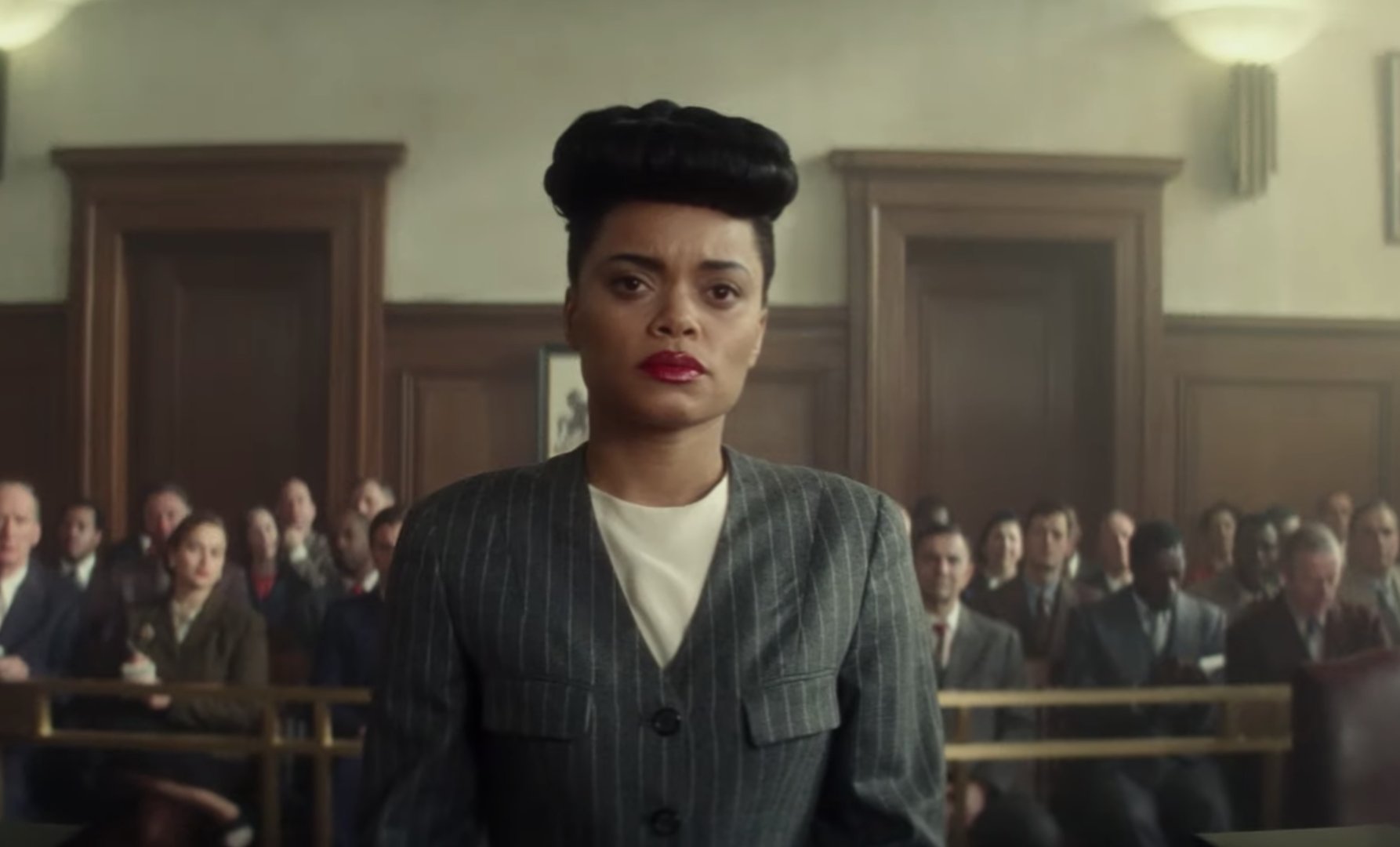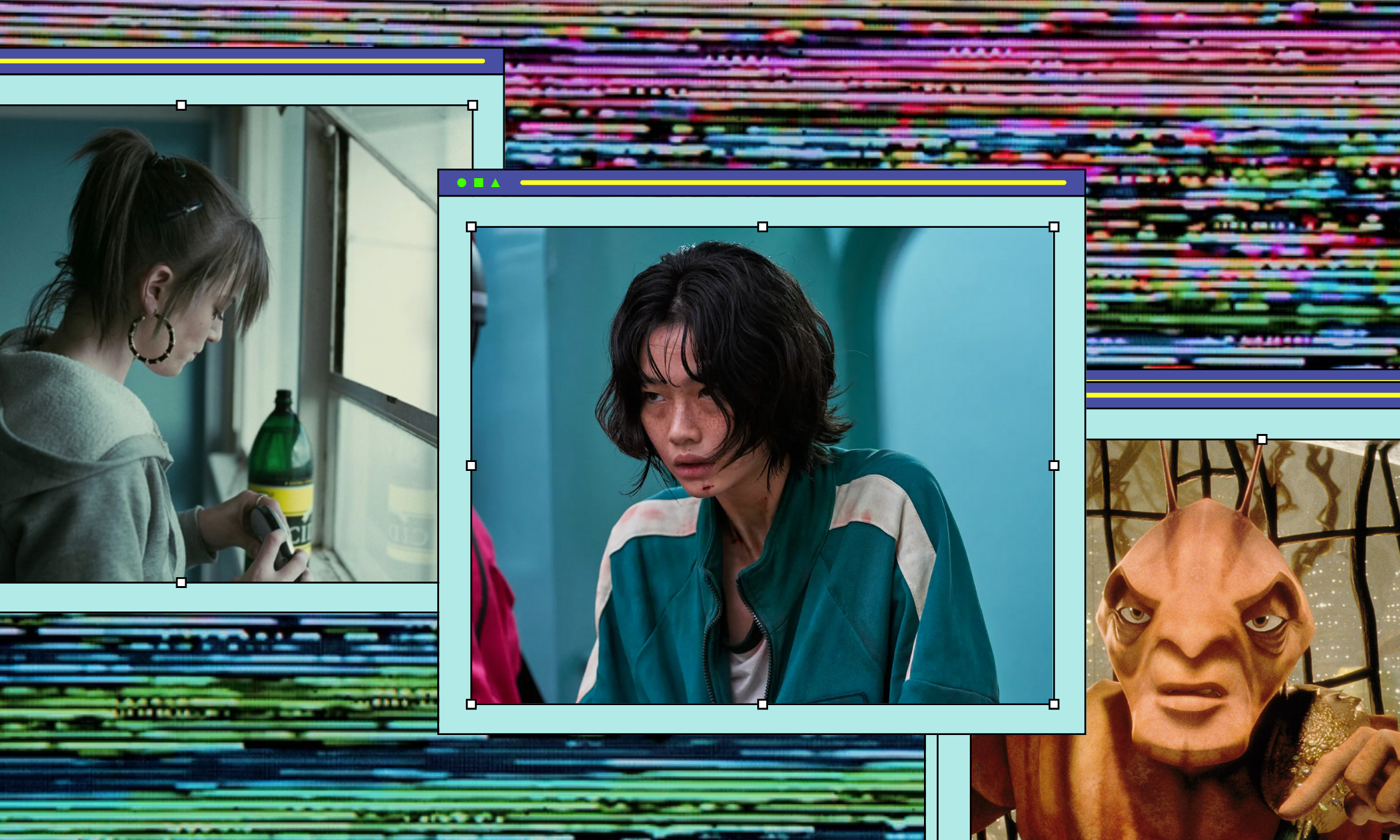
Courtesy of Sky
Billie Holiday, ‘Strange Fruit’ and the feared power of protest music
'Strange Fruit' soundtracked the genesis of the civil rights era and this film highlights how the state is terrified of politically engaged artists' influence
Memuna Konteh
04 Mar 2021
“Southern trees bear a strange fruit, blood on the leaves and blood at the root.” The velvet-soft jazz vocals are sweet yet haunting as they weave a tale of anguish. On stage, Billie Holiday stands in front of an audience of merry (mostly white) faces, revellers who came to dance flirt and drown their sorrows in the dim lighting of a raucous 1930s speakeasy, she stands boldly. Glassy-eyed, Black, glamorous and adorned with a sequined couture gown with a cinched waist that crushes her ribs. She’s expected to sing about romance, but instead, out of her mouth floats a heavy proclamation of pain. A damning reflection of the burden carried by black people at the time.
This scene is a highlight of The United States vs Billie Holiday, a gritty biopic which focuses on the jazz legend’s various run-ins with the US federal government. Her performances of the now iconic protest song, ‘Strange Fruit’ put a target on her back. The film looks to revamp Billie’s memory in the collective consciousness so that we might think of her as more than just a velvety vocalist with a crippling drug addiction. In doing so it lifts the lid on a tragic chapter of pop culture and politics many have forgotten.
Familiar names such as Moonlight’s Trevante Rhodes, Natasha Lyonne of Netflix’s Orange is the New Black and Tyler James Williams from Everybody Hates Chris and Dear White People may work to entice audiences, but it’s Grammy-nominated singer and first-time actress Andra Day’s mesmerising portrayal of Billie Holiday that will leave them in awe. It earned her the spot as the first Black woman in 35 years to win the Golden Globe for best actress last week. Her astonishing acting overshadows the sketchier aspects of the film (which has received mixed reviews), such as the slightly confusing jumps in the timeline that were used to convey the drug-stoked haziness of Billie’s own perspective.
Andra’s performance perfectly embodies the duality of the soulful songstress, born Eleanora Fagan. Eleanora became Billie Holiday on stage, in homage to classic Hollywood actress, Billie Dove, and was later famously dubbed Lady Day by her saxophonist, Lester Young. With many names to suit her many facets, she was a complex woman who was brazen, unapologetic and sensual while simultaneously reckless, vulnerable and traumatised. Andra captures this brilliantly and even manages to imitate her electrically soulful singing style with an almost eerie exactness.
Inspired by a chapter in John Harri’s 2015 best seller, Chasing the Scream: The First and Last Days of the War on Drugs, the storyline explores how Billie Holiday was one of the most high-profile targets for Harry J. Anslinger, who headed the US Treasury Department’s Federal Bureau of Narcotics (a precursor to today’s DEA) for 32 years. It redresses the rose-coloured dramatisation of the troubled singer’s life in the 1970’s movie, Lady Sings the Blues.
Part of Anslinger’s fixation with Billie was her refusal to stop performing ‘Strange Fruit’. She first sang the historic anti-lynching song in 1939, in Café Society, New York’s first integrated night club. Columbia Records, with whom she was contracted, refused to record the song but they did allow her to take it elsewhere. When the song was finally released under alternative jazz label Commodore, ‘Strange Fruit’ sold over a million copies and quickly became her best-selling track.
The rising popularity of the song was happening against a backdrop of an increasingly politicised Black population and a boom in lynching. It was fertiliser for freshly fortified grass-roots organisation towards civil rights- a combination that had the ruling classes (for whom Anslinger was a henchman) truly shook.
The FBI tried infiltrating Billie’s inner circle with one of their agents and even planted drugs on her themselves. Their desperation to silence ‘Strange Fruit’ speaks to the power that popular music has to challenge the status quo.
They resolved to go after Billie for her opiate habit but their real goal was to stifle the revolutionary power of protest song. The United States vs Billie Holiday brings to the forefront that Anslinger, as the architect of America’s war on drugs, loathed the rise of jazz culture and its potentially revolutionary implications more than the narcotics abuse that was wreaking havoc in Black neighbourhoods across the country.
“Their desperation to silence ‘Strange Fruit’ speaks to the power that popular music has to challenge the status quo”
The rhetoric that Black genres promote lawlessness or represent social or moral decay is long-standing. Rock and roll was too sexy. Disco scared the establishment and its records were burned. Bob Marley’s reggae carried revolutionary messages, but in the present his image is often reduced to that of a marijuana mascot. Even up until today, hip-hop, grime, and drill are blamed for gang violence and gun and knife crime. The powers that be have demonised Black art so consistently that our expression is often feared or treated with contempt (until it’s repackaged by white artists).
Just as the story of targeted Black artists is not new, ‘Strange Fruit’ was probably not the first song of its kind. However it explicitly spoke about the black experience and in many ways inspired listeners to question the systems and brutality of racism as the civil rights era beckoned. It’s reverence is such that it was covered by Nina Simone, a version which was sampled by Kanye West for his riotous track ‘Blood on Leaves’.
The song began its life as ‘Bitter Fruit’, a poem written by Jewish American Abel Meeropol. Afraid of any backlash, Meeropol published it under a pseudonym in a Teacher’s Union magazine. From there, it gained a little traction but it wasn’t until Billie began singing it that the famously harrowing lyrics “Black bodies swinging in the summer breeze/ Strange fruit hangin’ from the poplar trees” really took hold in the imagination of white America. She was aware that her voice could hypnotise a room and she chose to wield that magic to advocate for the dignity of her people.
When Billie sang ‘Strange Fruit’ she refused to hide the torment of being Black in a society that sees you as subhuman, disposable and deserving of brutal murder, the same cruel reality that drove her to use drugs in the first place.
She probably didn’t consider herself a freedom fighter, just as this label is missing from her legacy, but the film shows how her commitment to performing ‘Strange Fruit’ may have cost her life. In an era when the biggest hits were songs like Judy Garland’s ‘Over the Rainbow’ and Louis Armstrong’s ‘When the Saints Come Marching In’, Billie’s performance of ‘Strange Fruit’ showed entertainers of all races that there was honour in bringing politics to the stage. Without her we may never have had Bob Marley’s Burnin’ and Lootin’, NWA’s Fuck the Police, Kendrick Lamar’s Alright, or even Solange’s Don’t Touch My Hair. She paved the way for the broadcasting of Black rage, frustration and despair as a collective experience that is woven into our art for ourselves and others to fervently consume.
African Americans have been protesting lynching since the 1890s. In 1918 Republican Congressman Leonidas Dyer introduced the first ever anti-lynching bill, which was stopped by a filibuster. Since then, similar bills have been proposed in Congress 200 times, the latest being the 2020 Emmett Till Anti-Lynching Act which is still yet to pass.
With every attempt from the Black American resistance to tell the truth of their oppression, the authorities, fronted by men like Anslinger, have a counter narrative ready to distract from the cause. Whether it’s that the community is drug-crazed, or violent and predatory, white supremacists always have some excuse to vilify Black people and the music that speaks to the unique struggles in some Black communities.
Billie Holiday died at just 44 lay handcuffed to her deathbed, rapidly deteriorating due to the drug problem she’d never been allowed to heal from. She died surrounded by the same federal agents that spurred her addiction, a martyr of the Black liberation movement. While the film’s focus jumps from the singer’s sexuality, her abusive relationships and her fight with drug addiction, it’s the exploration of ‘Strange Fruit’ that is the film’s most salient point. It’s about time we have a film that puts some respect on her name and shows her in her multidimensionality glory. Long live protest music.








